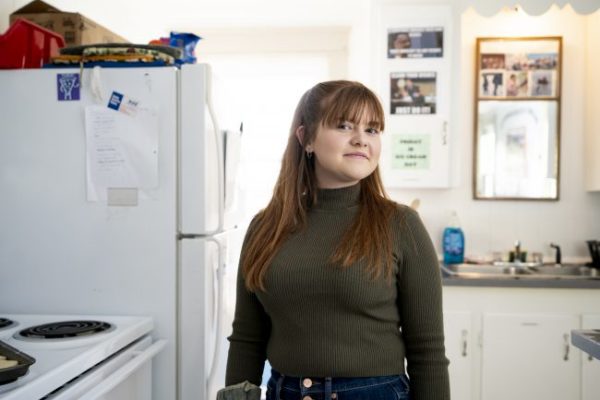
In November, a gift from Trustee Emerita Anne O’Hanian-Szostak ’72 and Michael J. Szostak ’72 created Colby’s first fund specifically for select students with a significant commitment to civic responsibility. This month, those inaugural fellows began work on projects ranging from documenting the stories of Waterville residents to bringing bereavement support to Waterville schools. These are their stories.
Emily Carter
Passionate about nutrition and healthy living, Emily Carter ’20 has committed to helping youth at the Waterville South End Teen Center learn how to make healthy decisions about diet and lifestyle. With her funding from the O’Hanian-Szostak Fellowship for Civic Leadership, Carter is developing a nutrition program at the Teen Center that connects youth with access to healthy foods. This is a program that had been brainstormed by the Teen Center but never executed; Carter is stepping in with evident passion and enthusiasm to kickstart this project.

Emily Carter is committed to teaching youth at Waterville’s South End Teen Center about healthy eating and cooking. (Photo by Gabe Souza)
The program consists of weekly visits to Waterville’s Uncle Dean’s natural food store to expose kids to healthy and unique foods. “As a plant-based eater, I am interested in developing their knowledge of plant-based foods and healthy eating in that way.” In addition, Carter has used the fellowship funding to provide the Teen Center with all new cookware and baking supplies so the teens can learn not only how to shop for healthy food, but also to cook it. The importance of these tools is paramount, she says. “The Teen Center is a place where they have a secure food source. They are always guaranteed a meal there. They’re even open in the summer for the sole purpose of providing food.”
Carter cites Assistant Professor of Environmental Studies Gail Carlson’s Global Public Health course as another source of inspiration for this project. “During the class, we talked about a lot of risk factors for disease, and diet is one of the main factors. It is especially crucial to address this issue in adolescents. I’ve always been passionate about nutrition. I thought this would be a great opportunity to align my passions with community action. It was a no-brainer.”
Looking to go into education after graduation, Carter has applied for Teach for America. “One of the questions for the TFA pre-interview was what would you do if a parent approached you about the lack of healthy options in cafeterias. In my position as a teacher, I plan to execute similar programs and make kids more aware of healthy options.”
Lorne Carter
Lorne Carter ’21 has always had a passion for social justice and community engagement. Since the day he stepped on Colby’s campus, he’s been eager to jump into community activism and volunteer work. He found his place at Waterville’s South End Teen Center, a safe community space for teens in the South End to come for mentorship, peer engagement, and fun. Carter’s proposal for the O’Hanian-Szostak Fellowship involves an artful revitalization of one of the teens’ favorite places at the SETC: the basketball court.
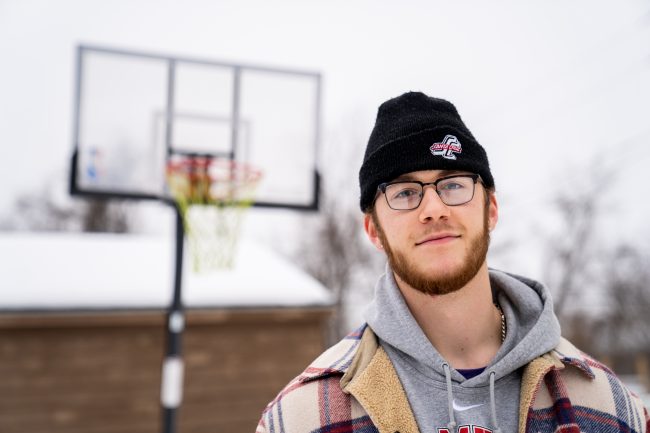
Lorne Carter plans an artful revitalization of the South End Teen Center’s basketball court. (Photo by Gabe Souza)
An artful revitalization looks like this: “We will paint court lines and a fun, colorful design on the blacktop and decorate surfaces adjacent to the court, such as chain-link fences and a shed, with art. The project will supply new hoops, balls, and other sports equipment to help the Teen Center enjoy their rejuvenated space.” And the best part? “The teens themselves will craft the vision for the new space.”
According to SETC Director Ryan Kneeland, the basketball court at the Teen Center is an important place of community building, but the space itself is hardly bigger than a driveway. “While we cannot physically expand,” Carter admits, “we can bring new life and energy to this space through close collaboration between SETC members and Colby volunteers.” But Carter believes this project goes beyond bringing new life to the basketball court. “The structure of this project is motivated by a belief in democratic decision-making, collective design, and placing agency over the space’s future with the community that calls it home.”
As someone who is planning to make community-based art projects and programming his career, Carter does not plan to end his civic engagement journey here. “This project is a perfect introduction to the type of creative, collaborative work I strive to do, and I am really excited to have a chance to lead and execute an original project that will have a tangible positive impact on the Waterville community. I hope this will be the first in a long line of successful projects to come.”
Caroline Epstein
Caroline Epstein ’21 found her roots in community engagement after taking Lifespan Development, a psychology course at Colby that requires each student to complete a civic engagement project. Epstein took this opportunity to partner with Hope’s Place, an affiliate of hospice. She has been a volunteer with Hope’s Place for two years, and now with the O’Hanian-Szostak Fellowship, she plans to expand her role and the services Hope’s Place offers as well. Epstein plans to bring Hope’s Place bereavement support groups to local Waterville schools.
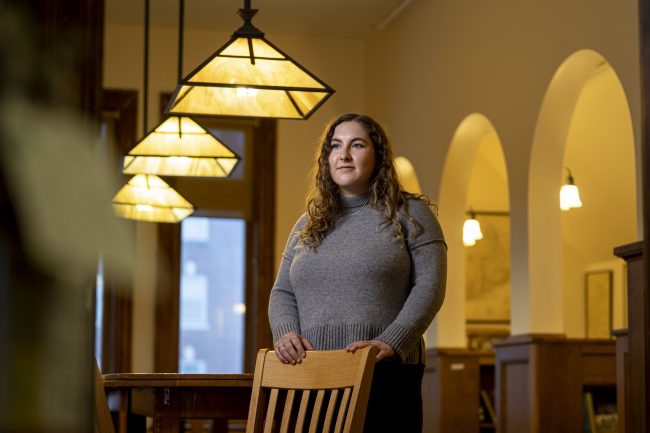
Caroline Epstein will create a children bereavement support group at a local elementary school using skills she learned working for Hope’s Place. (Photo by Gabe Souza)
“Hope’s Place has children and adult bereavement support groups a couple of sessions per year, but sometimes there are transportation issues, and with children, it can be hard to realize they might need help.” Bringing the group to local schools would remove some of the inhibitors to getting the necessary support from Hope’s Place.
Epstein plans to use the spring semester to administer a test run of the program with one local school, which will hopefully allow the program to grow in the next academic year. The support group would be a weekly event that would consist of a series of progressive sessions. This course of sessions would ideally be implemented a few times per year. Epstein stresses the importance of normalizing bereavement support. “Teaching healthy coping skills can be useful anywhere.”
Waterville schools have reached out in the past to Hope’s Place to try and orchestrate a project similar to Epstein’s model; however, the hospice affiliate lacked the necessary facilitators to do so. Epstein is happily filling this role. “I’ve been involved with Hope’s Place for two years, and I’ve seen the impact it has had on the community,” Epstein said. With the fellowship, “I wanted to take that and connect it to my academics; both Hope’s Place and Colby have worked to motivate me for my future. I really wanted to link the two together and have a bigger impact.”
As an education major with a concentration in human development, Epstein hopes to continue working with children and studying child psychology once she leaves Mayflower Hill in 2021. Before she does, she hopes to find a student to continue her Hope’s Place school partnership and continue the impactful work Hope’s Place does for those children struggling in the difficult period of bereavement.
Jackie Florman and Annie Muller
Outdoor enthusiasts and trip leaders Annie Muller ’22 and Jackie Florman ’22 are eager to share their passion for Maine’s natural beauty with Waterville youth at Messalonskee High School. With their funding from the O’Hanian-Szostak Fellowship program, Florman and Muller plan to partner with the high school’s outing club, “where we can lead trips for them, do skills workshops for them, and take them to do cool things they wouldn’t be able to do without the resources Colby has,” Muller said. She cites canoes and snowshoes as among the simple items used to explore the outdoors that are not necessarily accessible for everyone. “We’re hoping it can be something long term that continues in the future, a good healthy partnership where we are mentoring the students there and teaching them how to interact with the outdoors.”
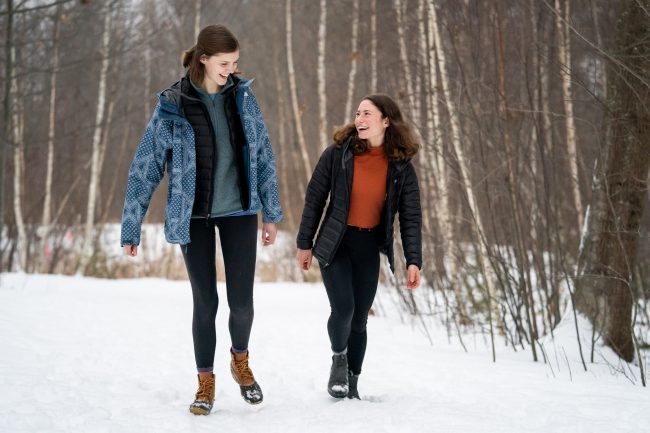
Annie Muller, left, and Jackie Florman in Colby’s Perkins Arboretum. The duo is working with area high schools on prioritizing outdoor leadership and education. (Photo by Gabe Souza)
With Colby’s robust Outing Club and a large population of outdoor enthusiasts, Florman and Muller don’t think it’ll be hard to gather more students who are interested. “We’re hoping to have as many mentorship opportunities between Colby students and the community as possible, because we think there’s a lot we can learn from them and they can learn from us,” Florman said.
Passion for nature and the outdoors is only half of it. “We really wanted to have some opportunity for outdoor education on campus,” Florman added. “There are a lot of programs that take Colby students outside, but not a lot that interact with the local community and help get them outside.” Going out into the community to help local youth access these opportunities is key. “We think Maine is a really special place. It’s beautiful here, and we want to get as many people outside as possible.”
As sophomores, Florman and Muller have the remainder of their time at Colby to continue to grow this program and inspire the community to get outside. But in the future? “I would definitely love to go into outdoor education,” Florman answered. “I would love to have my own outdoor education business of some kind. I am really interested in providing more access to the outdoors, so increasing accessibility is a big thing for me.” Muller plans to continue to return to YMCA Camp Greenville to lead trips for the next few years. “I envision helping in the leadership there, and I think these experiences would be very helpful.”
Luis Gonzalez Kompalic
Luis Gonzalez Kompalic ’20 is on a mission to give a voice to Waterville that will not be forgotten in a period rich with change. His project, Narrating Waterville, is one of five O’Hanian-Szostak Fellowship proposals. “The idea of it is to produce a personal historical document of the people who live, inhabit, and exist in Waterville. What I’m doing is going around and interviewing people and asking them to tell me stories about Waterville, their families, their businesses.”
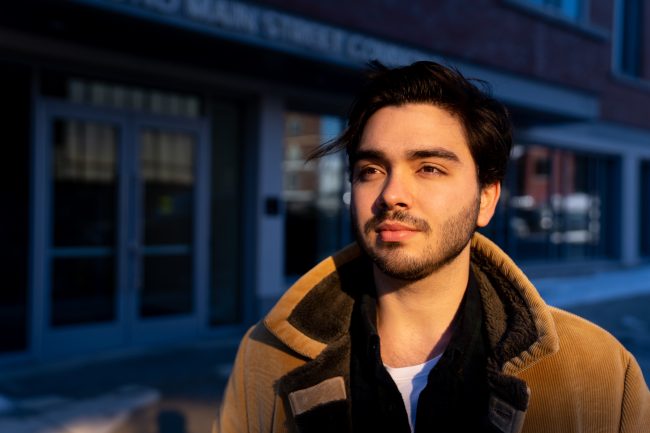
Luis Gonzalez Kompalic has spent the past several months talking to Waterville residents and conducting interviews about the community. (Photo by Gabe Souza)
The motivation behind this undertaking is significant and timely. “The whole point of this is to capture a moment in time when a lot of things are changing, to try and make sure the change doesn’t erase everything that was here before.” As a part of his senior project for the Latin American Studies Program, Narrating Waterville has been in the works for about a year. This semester Gonzalez Kompalic is focusing on the non-Colby community members in Waterville; to do so, he is taking a very literal approach. “My plan is setting up shop in businesses, bars, cafés, restaurants and putting up a sign that says, ‘Come tell me a story.’”
“A lot of things are changing,” Gonzalez Kompalic noted about the city we call home. “There are definitely worries and fears that there is going to be a people, a culture, a memory that is going to be forgotten. My drive is trying to hold that back a bit, because we are a part of the reason things are changing right now.” These changes, he assures, will be instrumental in the long run, but they do come at a cost to some community members. “This project is a way to make sure their identity stays alive throughout the changes, that they’re not lost in the process.”
Gonzalez Kompalic plans to stay in Waterville after graduation and hopes to continue this work, or a similar model, even after he walks across the commencement stage. He has applied for a Watson Fellowship with the goal of further developing this community-based storytelling.
Rachel Powers ’21
Community engagement has been a focus of Rachel Powers’s life long before she received an O’Hanian-Szostak Fellowship for Civic Leadership. “It’s something I always felt had to be done,” she said. As president of Planned Parenthood’s Generation Action Chapter on Colby’s campus, a downtown resident, and the Creative Writing Center’s Two Cents Talk Fellow, Powers is certainly doing it.
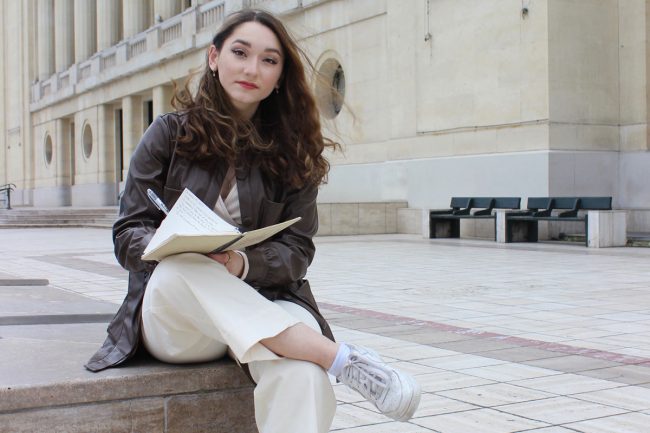
Rachel Powers will use creative writing to empower Waterville youth to explore their emotions and personal narratives through storytelling.
Her O’Hanian-Szostak Fellowship project combines her passion for creative writing with her dedication to the Waterville community. Powers’s goal is to create a creative writing workshop at the South End Teen Center, a place of mentorship and community where Waterville youth can learn to make healthy decisions. Powers hopes to bring in various trained creative writing Colby students to lead sessions and workshops for teens to learn how to express themselves in healthy, effective ways.
“I think legitimizing art as a tool of community organization and healing is essential in creating sustainable change,” she said. “Storytelling is a practice that we all engage in every day, whether or not we do it formally, and giving people the power to know that, A, their narratives matter and have impact on others but, B, that there are techniques and practices in which we can use this most effectively.”
Finding creative writing at Colby, Powers says, has changed her life. Her motivation behind this O’Hanian-Szostak Fellowship project is to make this passion accessible in the lives of the local youth. “My hope for these kids is that writing can become a real place of inquiry, sadness, joy, as it has become for me. I believe and hope that creating communities like this will make us more empathetic and equitable.”
Powers will continue to grow this partnership until she graduates, and she hopes the Colby creative writing community will carry on the passion and the program long after she’s gone. But before her Colby journey comes to an end, Powers hopes to see more engagement between the South End Teen Center and Colby.
“I think there are a lot of ways that we can make the resources we have at Colby available to students here in Waterville. We can invite them to talks, to events, have them engage with speakers and professors and build relationships that way. Another goal would be to have them participate in community open mics or other events like the new literary festival, potentially helping them jumpstart a local youth literary journal. That would be awesome.”